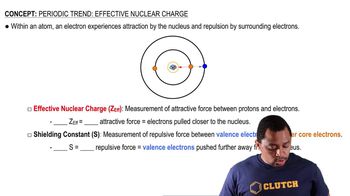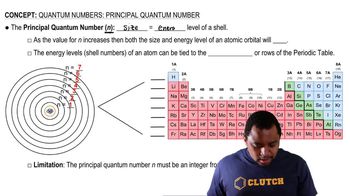Here are the essential concepts you must grasp in order to answer the question correctly.
Effective Nuclear Charge (Zeff)
Effective nuclear charge (Zeff) refers to the net positive charge experienced by an electron in a multi-electron atom. It accounts for the shielding effect of inner electrons that reduces the full nuclear charge felt by outer electrons. Understanding Zeff is crucial for predicting atomic properties such as ionization energy and atomic size.
Recommended video:
Ionization Energy (IE)
Ionization energy (IE) is the energy required to remove an electron from an atom or ion in its gaseous state. It is a key factor in determining the reactivity of an element, as elements with low ionization energies tend to lose electrons easily, while those with high ionization energies hold onto their electrons more tightly. The values of IE vary across the periodic table.
Recommended video:
Principal Quantum Number (n)
The principal quantum number (n) indicates the energy level of an electron in an atom and is a key factor in determining the electron's distance from the nucleus. Higher values of n correspond to electrons that are further from the nucleus and generally have higher energy. In the context of Zeff calculations, n is squared to reflect the increased energy associated with higher energy levels.
Recommended video:
 McMurry 8th Edition
McMurry 8th Edition Ch.6 - Ionic Compounds: Periodic Trends and Bonding Theory
Ch.6 - Ionic Compounds: Periodic Trends and Bonding Theory Problem 129
Problem 129



